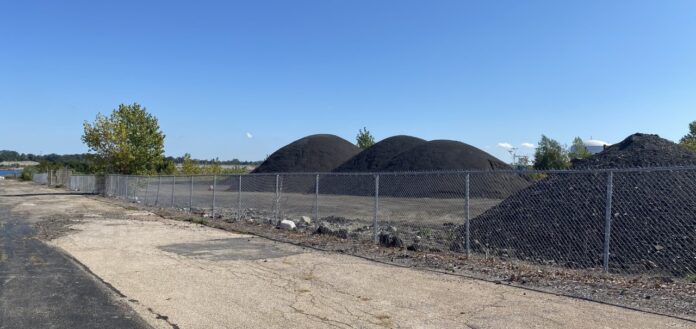
PROVIDENCE – City zoning regulators were unconvinced that allowing a Providence asphalt company to continue illegal use of a section of city waterfront along Allens Avenue was the best or only use for the property.
The city Zoning Board of Review on Wednesday unanimously voted to deny Narragansett Improvement Co.’s application for a use variance, which, if approved, would have granted the company an exemption to city zoning policies. The Providence-based company has been illegally storing and processing asphalt, stone and concrete on a leased space at 338 Allens Ave. for more than three years, defying city zoning laws which designate that the area must be used for waterfront or maritime activities.
In its application to the board dated Aug.24, Narragansett Improvement Co. described how its operations will suffer if it can no longer store and produce materials at the site. The company’s main offices, including a hot mix asphalt producing plant, are a third-mile down the street along Allens Avenue in an industrial-zoned area. Without the secondary site, it will be forced to truck in materials from farther away, costing more money, reducing its ability to compete with other producers and ultimately jeopardizing its long-standing business on Allens Avenue, the company stated in its application.
Dustin Everson, Narragansett Improvement Co.’s president, in testimony Wednesday described how giving up the secondary piece of property would cost his company “tens of thousands of dollars if not more” in trucking fees as well as the cost to dump the non-recycled material in the landfill.
Everson also said he was unaware he was violating city zoning policies until he received a violation notice from the city zoning office in late 2020. The 17-acre site is owned by Cumberland Farms, and was rented to Narragansett Improvement Co. in March 2018, according to the application.
Michael Resnick, the attorney representing Narragansett Improvement Co., urged the board to have some flexibility, noting that a pending contract for sale means the company is “winding down operations” and only asking for the zoning exemption for 10-12 months, or until the property is sold. Resnick also pointed out that the type of asphalt byproduct the company stores and processes at the site primarily comes from ProvPort, and could potentially be considered a waterfront use as the area was originally intended.
Board members were not convinced however, pointing out there was not even proof of a pending sale, nor an argument that no alternative uses are possible. Several also noted the financial gain the company reaps from continued operations.
City laws state the board can only grant exemptions to zoning designations under specific criteria such as that the business or property owner will not reap financial benefits from the exemption and that there is no possible alternative use for the property that fits with the allowed zoning.
The city Department of Planning and Development recommended the board deny the variance “as hardship isn’t evident.”
Roughly 20 area residents and community advocates also testified against the company, many reiterating prior written comments about the environmental, health and safety risks the company’s activities pose to the South Providence community.
Dr. Andrew Saal, chief medical officer for Providence Community Health Centers, which operates a health center 250 feet away from the storage and processing site, described the frequent smells, noise and chemicals burning the eyes of patients and employees.
Saal described one event in which a thick white cloud of smoke emanating from the site coated the cars parked in the health center lot in a thick tar-like substance that could not be cleaned with “conventional washing.”
Linda Perri, who heads the Washington Park Association, described watching the piles of asphalt and concrete grow larger and multiply during the company’s presence there. She pointed to the company’s illegal presence as the latest example in history and pattern of environmental racism that forces pollution and toxic chemicals onto residents of one of the city’s poorest areas, many of whom already face higher rates of asthma and other health problems.
“It doesn’t contribute to the health, safety and welfare of our community and that’s what you’re here to protect,” Perri said.
Local resident Greg Gerritt also questioned why the second site was necessary if the company, which according to its website has been in operation for over 100 years, has only been using it for the last three years.
Narragansett Improvement Co. has 20 days to file an appeal of the board’s decision to R.I. Superior Court, according to city policies.
Nancy Lavin is a PBN staff writer. You may reach her at Lavin@PBN.com.












